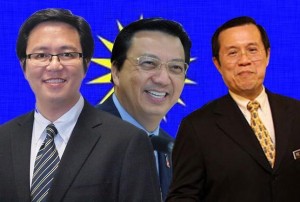Can a new captain steer MCA out of the storm?
 (L- R) Deputy president Gan Ping Sieu, Vice president Datuk Seri Liow Tiong Lai and former President Datuk Seri Ong Tee Keat. MCA now faces challenges it had never faced before: a landslide support of the Chinese community to the opposition because they are longing for change.
(L- R) Deputy president Gan Ping Sieu, Vice president Datuk Seri Liow Tiong Lai and former President Datuk Seri Ong Tee Keat. MCA now faces challenges it had never faced before: a landslide support of the Chinese community to the opposition because they are longing for change.
(fz.com) – There is no easy solution to MCA’s problems no matter who is elected as the party president in the coming party poll.
Former president Datuk Seri Ong Tee Keat may enjoy a reputation as a bold and vocal leader, but he had lost some support for his role in escalating the party infighting in the 2009 – 2010 period.
Second line leader Vice president Datuk Seri Liow Tiong Lai has political and governing experience, but he is seen as indecisive and his performance in recent years has not been very inspiring.
Deputy president Gan Ping Sieu, the youngest among the three leaders, with less baggage may seem to be able to bring some fresh air into the party but his leadership skills remain untested.
The continuous party infighting and the inability of the party to bring about an equal distribution of political, economic and social opportunities for the different communities in the country within the BN power-sharing model are among the reasons for the disastrous defeat of the party in the last general election.
Within ten years, MCA’s share of seats had dropped drastically from 31 parliamentary seats and 76 state seats in 2004 to seven parliamentary seats and 11 state seats in 2013.
It may seem like too little, too late has been done to help the party emerge from its current political turbulence. However, it may not be a totally hopeless case if some drastic measures are put in place.
Reform, the main thrust of Liow’s manifesto, or going back to the core values of the party, the crux of Gan’s manifesto, or Ong’s fighting to restore the dignity of the party may be beautiful words, but can the new leadership deliver what they promise, that is, to win back the support of the Chinese community?
The Chinese community certainly doubts it, and as a matter of fact, they don’t really care anymore. They have ditched the MCA because they were disappointed in the non-performance of the party in forging a nation in which everyone is equal and not called “outsiders” and asked to “go back to China.”
To put things into perspective, MCA now faces challenges it had never faced before: a landslide support of the Chinese community to the opposition because they are longing for change.
The Chinese voters had chosen the agenda offered by the opposition that strives for transparency, good governance and equality, against the services offered by the MCA for the past 64 years.
In a paper on the realignment of Chinese politics after GE13, political scientist Phoon Wing Keong said that the Chinese community had clearly shifted their political alignment, and this shifting is a rare occurrence which could lead to a realignment of the party system.
He observed that in the previous elections before 2008, the political party identification of the Chinese had always been stable, with the exception of 1969 general election, in which all the Chinese-based parties namely MCA, Gerakan, DAP and SUPP, managed to get their Chinese support base. This has changed in the 2013 GE.
Phoon believed that the main reason is that the current political system based on religious and racial differences is no longer working after many new issues concerning policy making and governance have surfaced, in addition to the emergence of a cross-community social movement. Hence, the Islamic state or hudud law issues constantly raised by the MCA could no longer scare the Chinese.
Also, he said, the MCA is losing its political function within the government system in order to connect with the voters. Further, it is seen as running away from pressing political issues, and as having lost its ability to put forward independent discourse, thus it lacks legitimacy within the Chinese community.
A long time political observer, Phoon has been very critical of the MCA under the leadership of former president Tan Sri Ong Ka Ting, in which the party had focused on issues unrelated to politics, such as the launch of the Lifelong Learning Campaign.
“The Chinese community has clearly stated that they are prepared to bid farewell to MCA in the 2013 GE. In hoping to return to the mainstream of politics, MCA doesn’t seem to grapple with this spirit of the times. Instead it has made a wrong judgment and used the ‘no-cabinet-post’ threat to hold the mainstream popular opinion of the Chinese community to ransom, and as a result, was swallowed by it,” Phoon said.
He said that the Chinese-based BN component parties must look seriously into the drastic drop of support in the two past consecutive elections and admit that their popular foundation has been severely damaged.
Another issue is that one of MCA’s biggest problems is its perceived lack of ideology or vision.
Ng Nyen Fah, Director of the Centre for Chinese Studies, said that MCA has yet to find a formula that could make the Chinese community feel that they have a place in this country.

